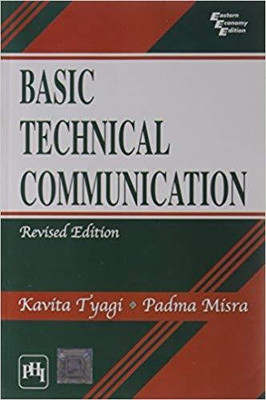Basic Technical Communication(English, Paperback, Tyagi Kavita)
Quick Overview
Product Price Comparison
The younger generation today aspires to work for multinational corporations, large organizations, or the civil services as these are more remunerative or invest them with more power. And, with the competition becoming stiffer each passing day, the ability to communicate effectively, precisely as well as acquiring communication skills has become an important determinant in getting jobs and subsequent growth and development. A plethora of books have flooded the market to capitalize on this frantic effort of the younger generation to become adept in communication and more so in technical communication. This comprehensive book on Basic Technical Communi-cation strives to focus on the communication skills needed by professionals. One of the major aims of this text is to enable students to acquire proficiency in the English language. Divided into five parts and 19 chapters, the text deals with the four essential ingredients of communicationŌĆöreading, writing, listening and speaking skillsŌĆöas well as their importance, objectives, types, and methods of improving these skills. The book also discusses how these skills can be effectively applied and provides considerable practice exercises. Key Features The text is logically organized with adequate practice in each part. Gives emphasis on grammar and pronunciation. Provides plenty of vocabulary on commonly mis-spelt words, difficult words, foreign words, and so on. This student-friendly book, suffused with practical examples, is primarily intended as a textbook for the first year students of engineering (B.Tech.) of Uttarakhand Technical University for their course on Basic Technical Communication. It will also be of immense benefit to undergraduate students and technical professionals across the country. Table of Contents Foreword Preface Part I: Basics of Technical Communication 1. Introduction to Technical Communication 2. Process of and Barriers to Communication Part II: Reading Skills 3. Learning Reading Skills 4. Word Formation 5. Vocabulary 6. Paragraph Development 7. Practice Readings (Reading 1ŌĆōOf Discourse) Francis Bacon 8. Practice Readings (Reading 2ŌĆōUnity of Minds) Dr. A.P.J. Abdul Kalam Part III: Writing Skills 9. Learning Technical Writing Skills 10. Functional Grammar 11. Requisites of Sentence Construction 12. The Art of Condensation (Precis Writing) 13. Formal and Informal Letters 14. Value based Critical Reading of Short Stories Part IV: Listening Skills 15. Learning Listening Skills 16. Study of One-Act Play Part V: Speaking Skills 17. Learning Speaking Skills 18. Organs of Speech and Phonetics 19. Syllable, Stress, Rhythm and Intonation 20. General Speaking Skills and Methods of Improving Speaking Skills Bibliography┬Ā Index


